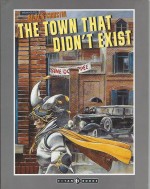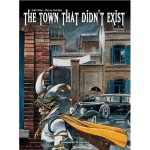

By Enki Bilal & Pierre Christin, translated by Tom Leighton (Titan Books & Humanoids Publishing)
ISBN: 978-1-85286-147-6 (1989)Â Â Â Â Â 978-1-93065-237-8 (2003)
Here’s a masterpiece of subtle moody comics storytelling criminally out of print and long overdue for rediscovery in the frankly incomprehensible modern English language comics marketplace.
Enes Bilalović AKA Enki Bilal was born in Belgrade in 1951 and broke into French comics in 1972 with Le Bal Maudit for Pilote. Throughout the 1970s he grew in skill and fame, and achieved English-language celebrity once his work began appearing in America’s Heavy Metal magazine.
Although best known for his self-scripted Nikopol Trilogy (Gods in Chaos, The Woman Trap and Cold Equator) this bleakly contemplative anti-capitalist fable always felt like a tale the socially-concerned and intellectually aware Serbian would like to be best remembered for; again scripted by old comrade Christin, and arguably Bilal’s most evocative and plaintive work.
In recent years Bilal returned to contemporary political themes with his much-lauded, self-penned Hatzfeld Tetralogy…
As if writing one of the most successful and significant comics series in the world (the groundbreaking and influential Valérian and Laureline series) was not enough, full-time Academician Pierre Christin has still found time over the years to script science-fiction novels, screenplays and a broad selection of comics, beginning in 1966 with Le Rhum du Punch with Valérian co-creator Jean-Claude Mézières.
The truly prolific Christin has produced stellar graphic stories with such artistic luminaries as Jacques Tardi, Raymond Poïvet, Annie Goetzinger, François Boucq, Jijé and many others, but whenever he collaborated with the brilliant Bilal, beginning in 1975 with their exotic and surreal Légendes d’Aujourd’hui or in other classic tales such as The Hunting Party or The Black Order Brigade, the results have never been less than stunning.
In this captivating, slyly polemical parable, aspiration, disdain, idealism and human nature have never been more coldly and clearly depicted…
Beginning and ending with a dream of something better, The Town That Didn’t Exist focuses on the recent past and the country’s depressed industrial North, where a strike at the cement works has prompted the death of the aged oligarch who has ruled the town and district of Jadencourt like a feudal baron for decades.
Generations of Hannard have run the web of businesses that put food on the table of the workers, but now that their first ever industrial action has killed the old man, tensions, passions, opinions and rumours are running wild…
With Hannard’s cronies and yes-men equally unsure of their futures, the Board of Directors gathers to determine who will lead the company in the trying times ahead and are compelled to accept that the old man’s solitary, long-sequestered invalid granddaughter has to take the helm – even if in name only…
With workers terrified of losing even their meagre subsistence livelihood and the comfortably installed fat-cats fearing the surrender of so very much more, the pallid, ethereal Madeleine Hannard is dragged from the bleak, rugged and lonely beach and house which have been her refuge for seven years and moves into the morass of boiling cauldrons, bubbling and brewing amidst the closed and grimy alleys of Jadencourt…
She soon proves to be as powerful a personality as her grandfather and by charm, duplicity and force of will manages to unite the perpetually warring and self-serving sides on management and labour in an incredible, groundbreaking, benignly doctrinaire project.
Ignoring cries to rationalise the companies, lay off workers and reorganise the corporation, Madeleine counters with an insane proposal: expansion, full employment and a retasking of every commercial and design resource into the construction of a fantastic, enclosed and self-perpetuating City under a dome – a utopian paradise where everybody will live in perfect harmony forever free from want and need…
The hardest people to convince are the downtrodden workers who have the most to gain, but once they are aboard the plan proceeds apace. Within a year Jadencourt is gone and an utterly unique paradise under glass is filled with the once hopeless and aspiration-deprived citizenry…
However, some people cannot be satisfied even when they have everything they ever dreamed of…
A telling and effective portrayal of greed, self-interest, disillusionment and the innate snobbery plaguing every class of modern society, this lyrically uncompromising examination of the failure of even the most benign tyranny is a mesmerising, beguiling and chilling parable which methodically skins the hide from an idealistic dream and spills the dark hot guts of guilt, arrogance and the pursuit of power in a sublime example of graphic narrative’s unique facility to tell a story on a number of levels.
In 1989 Titan Books released The Town That Didn’t Exist in a captivating softcover album as part of their push to popularise European comics classics, and in 2003Â Humanoids Publishing published a sturdy oversized (315x 238mm) hardback edition for the US market, either of which will delight any fan in search of a more mature and thought-provoking reading experience.
© 1989 Dargaud Editeur, Paris by Christin & Bilal. English language edition © 1990 Titan Books. All Rights Reserved.

I love how Humanoids have started creating oversized hardcover slipcased collections of many of their productions (or in some cases no slipcase but SUPER oversized instead).
This book, and anything else Bilal, would do wonderful to be released in this format! 🙂